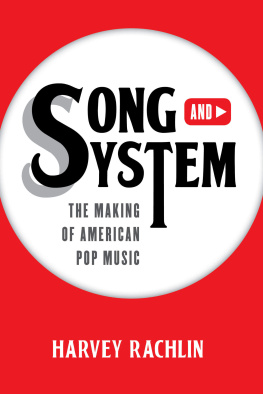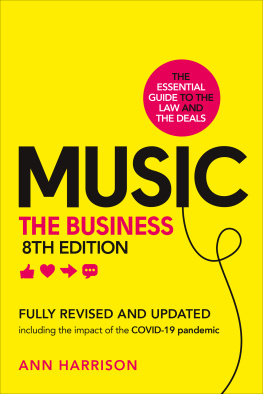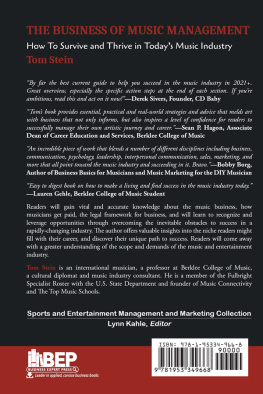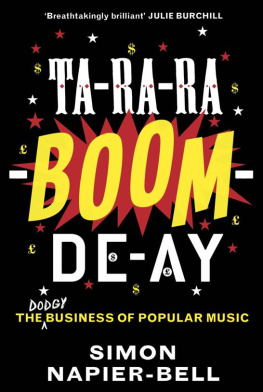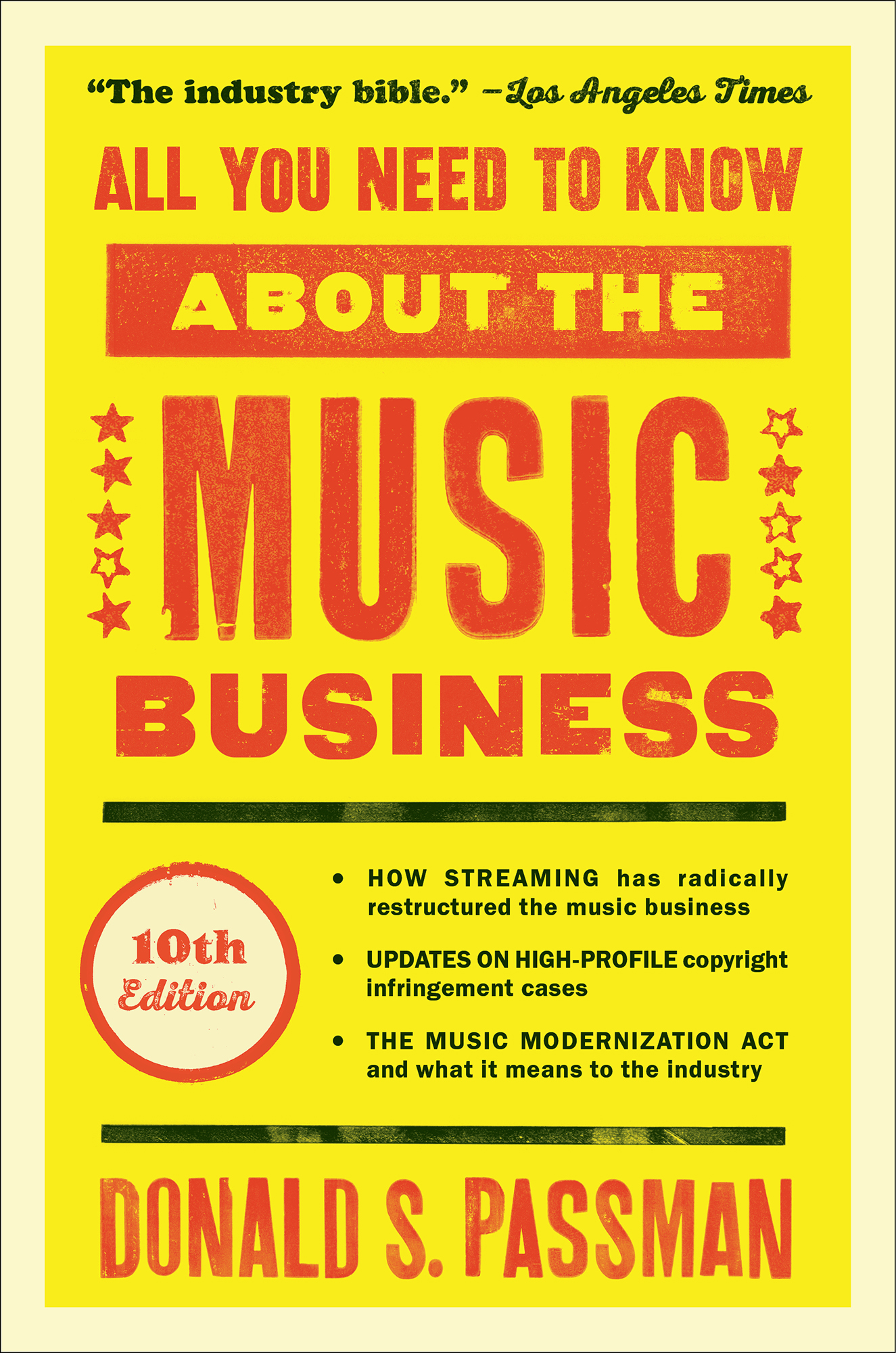Contents
Guide
Also by Donald S. Passman
The Amazing Harvey
The Visionary
Mirage

Simon & Schuster
1230 Avenue of the Americas
New York, NY 10020
www.SimonandSchuster.com
Copyright 1991, 1994, 1997, 2000, 2003, 2006, 2009, 2012, 2015, 2019 by Donald S. Passman
All rights reserved, including the right to reproduce this book or portions thereof in any form whatsoever. For information address Simon & Schuster Subsidiary Rights Department, 1230 Avenue of the Americas, New York, NY 10020.
This Simon & Schuster hardcover edition October 2019
SIMON & SCHUSTER and colophon are trademarks of Simon & Schuster, Inc.
For information about special discounts for bulk purchases, please contact Simon & Schuster Special Sales at 1-866-506-1949 or .
The Simon & Schuster Speakers Bureau can bring authors to your live event. For more information or to book an event contact the Simon & Schuster Speakers Bureau at 1-866-248-3049 or visit our website at www.simonspeakers.com.
Jacket design by Alex Camlin
Library of Congress Cataloging-in-Publication Data is available.
ISBN 978-1-5011-2218-7
ISBN 978-1-9821-5115-7 (ebook)
Did You Know That
- Most record deals dont require the record company even to make a record, much less to release it?
- You dont have to register in Washington to get a copyright?
- If we write a song together, and you write only the lyrics and I write only the music, each of us owns a piece of the music and each of us owns a piece of the lyrics? And that neither of us can use just the music, or just the lyrics, without paying the other?
- Prior to 1972, the United States had no copyright law prohibiting the unauthorized reproduction of records?
- Some film music composers cant even write music, much less create the arrangements for each instrument of an orchestra?
- A brain surgeon and a rock star have something in common?
To my precious Shana, and our growing family: Danny, Soundis, David, Rona, Josh, Lindsey, Jordan, Dorianne, Benjamin, Talia, Billy, Noa, and Leo
Acknowledgments
PLEASE READ MY THANK-YOUS. I KNOW ITS A BUNCH OF PEOPLE YOUVE PROBABLY NEVER HEARD OF, BUT THINK HOW MUCH YOUD WANT OTHER PEOPLE TO READ IT IF YOUR NAME WAS HERE.
No creative work is ever the product of one person alone (no matter how tempting it is to believe my own hype), so I want to acknowledge and thank all the following people for their inspiration and help:
Payson Wolff and Bruce Ramer, my mentors and spiritual brothers.
Bea Shaw, my mommy, who helped edit the first edition, and who paid for my first soft-drink stand.
Snuff Garrett, for believing in me early on.
Mike Gorfaine and R. Diane McKain, for their invaluable advice on film and TV music.
Gene Salomon, for his invaluable input and strategic thinking (always study the endgame).
Ethan Schiffres, the rock star lawyer.
Rob Light, for help with the touring section.
Ed Ritvo, for the confidence to do all sorts of things.
Larry Apolzon and Steve Bigger, for help with protecting the rights in names.
Peter Anderson, for the copyright infringement section.
Dave Dunton (in the very beginning) and Stephanie Frerich, for getting this book into the hands of readers.
Alan Garner, for his extraordinary communication skills and advice on conversation, books, and salesmanship.
Kim Mitchell, my incredibly indispensable assistant.
Jules Levine and Corky, for having bulldogs.
Michael Cannon Jr., for his cleverness in updating the royalty chart.
In addition, the following people (in alphabetical order) generously shared their expertise: David Altschul, Jill Berliner, Don Biederman, Kevin Breen, Nancy Chapman, David Cohen, Gary Cohen, Glenn Delgado, Bruce Eisenberg, Steven Fabrizio, Gary Ford, Russell Frackman, Dell Furano, Steve Gawley, Neil Gillis, Mark Goldstein, Lauren Gordon, Trudy Green, Jeff Hill, Zach Horowitz, Cathy Jacobson, Howard Kaufman, Larry Kenswil, Steve Lyon, Jay Morgenstern, Jay Murray, Michael Ostroff, Ed Pierson, Peter Reichardt, Bruce Resnikoff, Jack Rosner, Tom Ross, Joe Salvo, Rose Schwartz, Joel Sill, Patricia Smith, Lon Sobel, Mike Steinberg, Sandy Tanaka, Lance Tendler, Ray Tisdale, Tracie Verlinde, Wayne Volat, Lenny Waronker, and Ron Wilcox.
FOR THIS TENTH EDITION, special thanks to (alphabetically): Olivia Barton, Lenny Beer, Ken Bunt, Tom Cavanaugh, Gary Cohen, Patti Coleman, Peter Edge, Paula Erickson, Richard Feldstein, Marc Geiger, Lee Goforth, Wendy Goldstein, David Israelite, Joe Kluger, Albrecht Klutmann, David Kokakis, Dennis Kooker, Michael Kushner, Tom MacDougall, Alli Macgregor, Brian Meath, John Meglen, Irwin Nachimson, Brad Prendergast, Bobby Rosenbloum, Andrew Ross, Steve Schnur, Sarah Scott, Cary Sherman, Mike Steinberg, Helen Stotler, Scott Swift, Lisa Thomas, Jake Udell, Mat Vlasic, Emily White, Ron Wilcox, Pat Woods, Simon Woods, and Matt Young.
IMPORTANT
The materials in this book represent the opinions of the author and may not be applicable to all situations. Many circumstances appear similar, but differ in respects that may be legally significant. In addition, laws and customs change over time, and by necessity of the lapse in time between the writing and printing of this book, some aspects may be out of date even upon first publication. Accordingly, the author and publisher assume no responsibility for actions taken by readers based upon the advice offered in this book. Each reader should use caution in applying any material contained in this book to his or her specific circumstance, and should seek the advice of an appropriate professional. (Authors note: Use your common sense and be careful!)
First Steps
STATE OF THE UNION
This tenth edition is the most extensive rewrite of my book since the first edition.
Thats because the music industry has changed more radically in the last few years than at any other time in its history.
Let me explain:
Since the 1890s, music has been monetized by selling something: wax cylinders, piano rolls, shellac records, vinyl records, cassettes, CDs, and cheesy merchandise (well, I guess were still doing that). But the business is no longer based primarily on sales. Spotify, Apple Music, Amazon Music, YouTube, and similar services have revolutionized how people consume music, so that streaming is now the dominant revenue source for recorded music. And this change is WAY more drastic than you might think.
Consider this:
- In the past, when record sales were the mainstay of the recorded music business, you could go to a record store and buy two or three records at a time. Today, you can only stream one song at a time. That may not seem like a big deal, but
- In the days of sales, an artist was paid the same money for each record sold, regardless of whether a buyer listened to it a thousand times or never took it out of the shrink wrap and used it as a doorstop. But today, the more listens you have, the more money you make. However
- In the old days, if my records sold big numbers, it didnt make any difference to the number of sales you had. Your fans would buy your albums, and my fans would buy mine. In fact, if you had a big seller, it would bring a lot of people into record stores, and that increased the chances of selling my records. But in the streaming world, thats no longer true. For reasons well discuss later, the more listens you get, the less money I make. A truly radical change.


